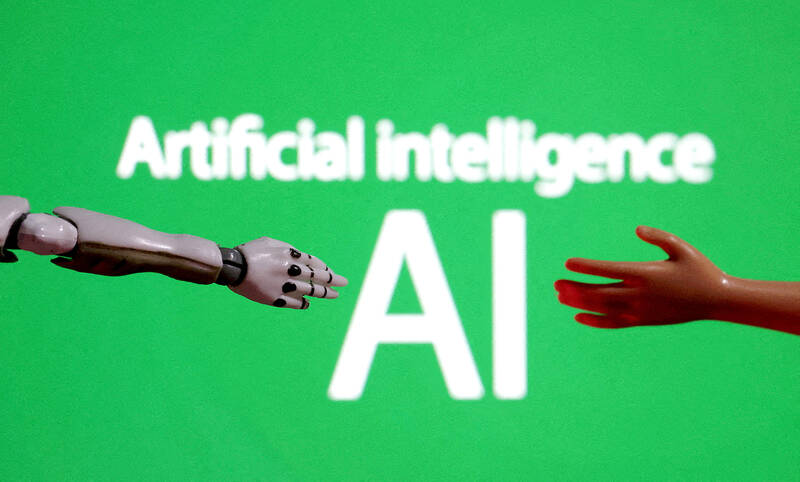They are cute, even cuddly, and promise learning and companionship — but artificial intelligence (AI) toys are not safe for kids, children’s and consumer advocacy groups said, urging parents not to buy them during the holiday season.
These toys, marketed to kids as young as two years old, are generally powered by AI models that have already been shown to harm children and teenagers, such as OpenAI’s ChatGPT, said an advisory published on Thursday by the children’s advocacy group Fairplay and signed by more than 150 organizations and experts such as child psychiatrists and educators.
“The serious harms that AI chatbots have inflicted on children are well-documented, including fostering obsessive use, having explicit sexual conversations, and encouraging unsafe behaviors, violence against others and self-harm,” Fairplay said.

Photo: Reuters
AI toys, made by companies including Curio Interactive and Keyi Technologies (可以科技), are often marketed as educational, but Fairplay said they can displace important creative and learning activities.
They promise friendship, but disrupt children’s relationships and resilience, the group said.
“What’s different about young children is that their brains are being wired for the first time and developmentally it is natural for them to be trustful for them to seek relationships with kind and friendly characters,” said Rachel Franz, director of Fairplay’s Young Children Thrive Offline Program.
Because of this, the trust young children are placing in these toys can exacerbate the types of harms older children are already experiencing with AI chatbots, she said.
A separate report on Thursday by Common Sense Media and psychiatrists at Stanford University’s medical school warned teenagers against using popular AI chatbots as therapists.
Fairplay, a 25-year-old organization formerly known as the Campaign for a Commercial-Free Childhood, has been warning about AI toys for years. They just were not as advanced as they are today. A decade ago, during an emerging fad of Internet-connected toys and AI speech recognition, the group helped lead a backlash against Mattel’s talking Hello Barbie doll that it said was recording and analyzing children’s conversations.
Although AI toys are mostly sold online and more popular in Asia than elsewhere, some have started to appear on store shelves in the US and more could be on the way, Franz said.
“Everything has been released with no regulation and no research, so it gives us extra pause when all of a sudden we see more and more manufacturers, including Mattel, who recently partnered with OpenAI, potentially putting out these products,” Franz said.
It is the second big seasonal warning against AI toys since consumer advocates at US Public Interest Research Group (PIRG) last week called out the trend in its annual Trouble in Toyland report that typically looks at a range of product hazards, such as high-powered magnets and button-sized batteries that young children can swallow.
This year, the organization tested four toys that use AI chatbots.
“We found some of these toys will talk in-depth about sexually explicit topics, will offer advice on where a child can find matches or knives, act dismayed when you say you have to leave, and have limited or no parental controls,” the report said.
One of the toys, a teddy bear made by Singapore-based FoloToy, was later withdrawn, its CEO told CNN this week.
Young children do not have the conceptual tools to understand what an AI companion is, said Dana Suskind, a pediatric surgeon and social scientist who studies early brain development.
While kids have always bonded with toys through imaginative play, when they do this, they use their imagination to create both sides of a pretend conversation, “practicing creativity, language and problem-solving,” she said.
“An AI toy collapses that work. It answers instantly, smoothly and often better than a human would. We don’t yet know the developmental consequences of outsourcing that imaginative labor to an artificial agent — but it’s very plausible that it undercuts the kind of creativity and executive function that traditional pretend play builds,” Suskind said.
Beijing-based Keyi, maker of an AI “petbot” called Loona, did not return requests for comment this week, but other AI toymakers sought to highlight their child safety protections.
California-based Curio Interactive makes stuffed toys, such as Gabbo and rocket-shaped Grok, that have been promoted by the pop singer Grimes.
The company said it has “meticulously designed” guardrails to protect children and encouraged parents to “monitor conversations, track insights, and choose the controls that work best for their family.”
In response to the earlier PIRG findings, Curio said it is “actively working with our team to address any concerns, while continuously overseeing content and interactions to ensure a safe and enjoyable experience for children.”
Another company, Miko, based in Mumbai, India, said it uses its own conversational AI model rather than relying on general large language model systems such as ChatGPT to make its product — an interactive AI robot — safe for children.
“We are always expanding our internal testing, strengthening our filters, and introducing new capabilities that detect and block sensitive or unexpected topics,” Miko CEO Sneh Vaswani said. “These new features complement our existing controls that allow parents and caregivers to identify specific topics they’d like to restrict from conversation. We will continue to invest in setting the highest standards for safe, secure and responsible AI integration for Miko products.”
Miko’s products are sold by major retailers such as Walmart and Costco, and have been promoted by the families of social media “kidfluencers” whose YouTube videos have millions of views. On its Web site, it markets its robots as “Artificial Intelligence. Genuine friendship.”
Ritvik Sharma, the company’s senior vice president of growth, said Miko actually “encourages kids to interact more with their friends, to interact more with the peers, with the family members etc. It’s not made for them to feel attached to the device only.”
However, Suskind and children’s advocates said analog toys are a better bet for the holidays.
“Kids need lots of real human interaction. Play should support that, not take its place. The biggest thing to consider isn’t only what the toy does; it’s what it replaces. A simple block set or a teddy bear that doesn’t talk back forces a child to invent stories, experiment and work through problems. AI toys often do that thinking for them,” Suskind said. “Here’s the brutal irony: When parents ask me how to prepare their child for an AI world, unlimited AI access is actually the worst preparation possible.”

JITTERS: Nexperia has a 20 percent market share for chips powering simpler features such as window controls, and changing supply chains could take years European carmakers are looking into ways to scratch components made with parts from China, spooked by deepening geopolitical spats playing out through chipmaker Nexperia BV and Beijing’s export controls on rare earths. To protect operations from trade ructions, several automakers are pushing major suppliers to find permanent alternatives to Chinese semiconductors, people familiar with the matter said. The industry is considering broader changes to its supply chain to adapt to shifting geopolitics, Europe’s main suppliers lobby CLEPA head Matthias Zink said. “We had some indications already — questions like: ‘How can you supply me without this dependency on China?’” Zink, who also

The number of Taiwanese working in the US rose to a record high of 137,000 last year, driven largely by Taiwan Semiconductor Manufacturing Co’s (TSMC, 台積電) rapid overseas expansion, according to government data released yesterday. A total of 666,000 Taiwanese nationals were employed abroad last year, an increase of 45,000 from 2023 and the highest level since the COVID-19 pandemic, data from the Directorate-General of Budget, Accounting and Statistics (DGBAS) showed. Overseas employment had steadily increased between 2009 and 2019, peaking at 739,000, before plunging to 319,000 in 2021 amid US-China trade tensions, global supply chain shifts, reshoring by Taiwanese companies and

Taiwan Semiconductor Manufacturing Co (TSMC, 台積電) received about NT$147 billion (US$4.71 billion) in subsidies from the US, Japanese, German and Chinese governments over the past two years for its global expansion. Financial data compiled by the world’s largest contract chipmaker showed the company secured NT$4.77 billion in subsidies from the governments in the third quarter, bringing the total for the first three quarters of the year to about NT$71.9 billion. Along with the NT$75.16 billion in financial aid TSMC received last year, the chipmaker obtained NT$147 billion in subsidies in almost two years, the data showed. The subsidies received by its subsidiaries —

OUTLOOK: Pat Gelsinger said he did not expect the heavy AI infrastructure investments by the major cloud service providers to cause an AI bubble to burst soon Building a resilient energy supply chain is crucial for Taiwan to develop artificial intelligence (AI) technology and grow its economy, former Intel Corp chief executive officer Pat Gelsinger said yesterday. Gelsinger, now a general partner at the US venture capital firm Playground Global LLC, was asked at a news conference in Taipei about his views on Taiwan’s hardware development and growing concern over an AI bubble. “Today, the greatest issue in Taiwan isn’t even in the software or in architecture. It is energy,” Gelsinger said. “You are not in the position to have a resilient energy supply chain, and that,